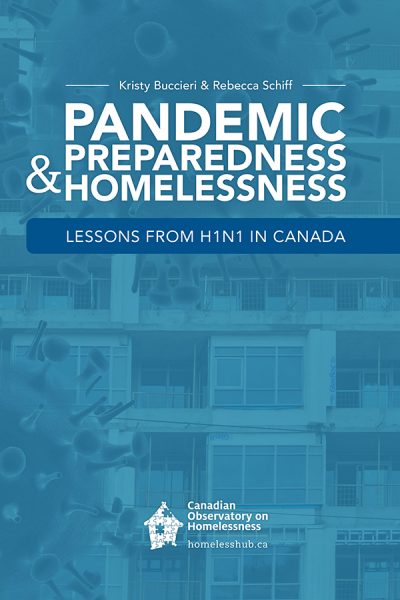TORONTO, October 13, 2016 – Homeless people may be some of the hardest hit in a pandemic, but pandemic preparedness plans often don’t include them. A new book looks at the unique challenges and issues of pandemic planning, preparedness and response when it comes to homelessness populations and those that work with them across Canada.

Cover of new book, Pandemic Preparedness & Homelessness
Pandemic Preparedness and Homelessness: Lessons from H1N1 in Canada, co-edited by York University alumna Kristy Buccieri with chapters by York U education Professor Stephen Gaetz, director of the Canadian Observatory on Homelessness, and Osgoode Hall Law School Professor Janet Mosher, presents findings from a multi-year, multi-city study. The goal is to provide a guide to better pandemic preparedness planning for some of the country’s most vulnerable people.
The research examined the planning for and response to the H1N1 influenza pandemic in 2009 and 2010, and how it impacted the homeless in four cities – Victoria, Calgary, Regina and Toronto. The researchers surveyed and interviewed homeless individuals, as well as service providers and key stakeholders.
Gaetz led the Toronto area research involving 149 participants, while Bernadette Pauly led Victoria with 44 participants, Jeannette Waegemakers Schiff led Calgary with 118 participants and Rebecca Schiff led Regina with 40 participants. Twenty four per cent of participants were youth, 31 per cent Aboriginal and 42 per cent identified as LGBTQ.
Gaetz and Buccieri discuss how the current emergency-based Canadian response to homelessness is unsustainable and, during another pandemic outbreak, will further put the health and well-being of homeless people at risk. They argue there needs to be support for planning, infection control, system capacity, inter-sectoral collaboration, communications and training, and unpredictability.
Mosher looks at how pandemics are considered global threats to national security and instead suggests looking at them through a social justice lens with a focus on the social determinants of health.
The book’s authors also look at how the four Canadian cities planned and handled the H1N1 outbreak, the effect it had on homeless individuals, what worked and what needs to change, such as the elimination of social and structural barriers to care.
York University is known for championing new ways of thinking that drive teaching and research excellence. Our students receive the education they need to create big ideas that make an impact on the world. Meaningful and sometimes unexpected careers result from cross-discipline programming, innovative course design and diverse experiential learning opportunities. York students and graduates push limits, achieve goals and find solutions to the world’s most pressing social challenges, empowered by a strong community that opens minds. York U is an internationally recognized research university – our 11 faculties and 26 research centres have partnerships with 200+ leading universities worldwide. Located in Toronto, York is the third largest university in Canada, with a strong community of 53,000 students, 7,000 faculty and administrative staff, and more than 295,000 alumni.
-30-
Media Contact:
Oxana Roudenko, Canadian Observatory on Homelessness, 416-736-2100 ext. 33376, oroudenko@edu.yorku.ca
